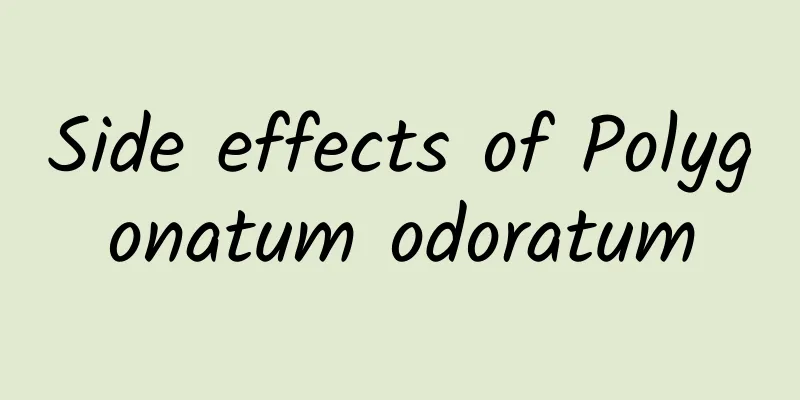Side effects of Polygonatum odoratum

|
Speaking of the herb Polygonatum, I believe many people are familiar with it. In fact, Polygonatum odoratum has a wide distribution range and generally grows in a humid environment. In addition, the rhizome of Polygonatum odoratum can be used for medicinal purposes, and generally has the effects and functions of effectively lowering blood sugar and blood pressure. But Polygonatum odoratum is a medicine after all, and many people are worried about its side effects. So what are the side effects of Polygonatum odoratum? Does Polygonatum odoratum have any side effects? There is a Chinese saying that goes, "All medicines are poisonous to some extent." This sentence tells us that all medicines have certain side effects. Although the efficacy and effects of Polygonatum odoratum are very significant, many people are still afraid of its side effects. Below I will give you a detailed introduction to the side effects of Polygonatum odoratum. Polygonatum odoratum is a perennial herb of the Liliaceae family. The rhizome is horizontal, fleshy and yellowish white, with many densely covered fibrous roots. The leaves are green above and grey underneath. Flowers are axillary, usually in clusters of 1 to 3. It is native to southwestern China, but is widely distributed in the wild. It is cold-resistant and shade-tolerant, likes a humid environment, and is suitable for growing in loose soil rich in humus. "Bencao Jing Jizhu" says "the stem is strong and straight, like a bamboo arrow shaft, with nodes." Hence the name Polygonatum odoratum. The rhizome of the plant can be used for medicinal purposes, and its Chinese name is Yuzhu. It is harvested in autumn, washed, dried in the sun until soft, rubbed repeatedly, and dried in the sun until there is no hard core. Dry it in the sun, or steam it thoroughly, rub it until it is translucent, dry it in the sun, and cut it into thick slices or sections for use. The flavonoids extracted from Polygonatum odoratum and deoxynojirimycin extracted from mulberry leaves are combined to form a new substance - pancreatic sedative, which has the effects of lowering blood sugar, blood lipids, and blood pressure. Main Value Functions and indications: Nourishing yin, moistening dryness, relieving restlessness and quenching thirst. It is used to treat damage to the yin caused by fever, cough, thirst, fatigue, fever, easy hunger after digestion, and frequent urination. Pharmacological Action 1. Effect on the heart: Small doses of Polygonatum odoratum decoction and tincture can rapidly increase the heartbeat of isolated frogs, while large doses can weaken or even stop the heartbeat. Some reports believe that the effect of Polygonatum odoratum on the heart is related to the lily of the valley glycosides and lily of the valley glycosides contained in it. Experiments show that: Polygonatum odoratum injection (100%) has little effect on the isolated frog heart at small doses, but has an inhibitory effect at large doses; it first inhibits and then excites the contractility of the isolated rabbit heart, and has no effect on the heart rate; it has no obvious effect on the contractility and heart rate of the rabbit's in situ heart; and it has a certain protective effect on acute myocardial ischemia in rabbits caused by posterior pituitary hormone. 2. Effect on blood pressure: When 1-5 ml of 20% Polygonatum odoratum decoction is injected intravenously into rabbits, the blood pressure rises slowly. Small doses of Polygonatum odoratum decoction have no effect on the blood pressure of anesthetized dogs, while larger doses can temporarily lower their blood pressure. There are also reports that the infusion and decoction of Polygonatum odoratum stems and leaves (the variety is not specified) have a short-term antihypertensive effect on rabbits and dogs. After cutting the vagus nerves on both sides and injecting atropine, the antihypertensive effect is weakened. 3. Effect on blood sugar: Intramuscular injection of 0.5g/kg Polygonatum odoratum extract into rabbits can increase blood sugar. Oral administration of Polygonatum odoratum extract can increase blood sugar first and then decrease. It has a significant inhibitory effect on hyperglycemia caused by adrenaline, and also has an inhibitory effect on hyperglycemia in rats caused by glucose and alloxan. 4. Effect on blood vessels: The results of the frog's systemic vascular and lower limb vascular perfusion experiment showed that 20% decoction of Polygonatum odoratum (produced in Laoshan, Shandong) can significantly reduce vascular perfusion. Intravenous injection of 10 ml of 20% Polygonatum odoratum decoction into anesthetized dogs can reduce renal volume. 5. Plaque effects: Polygonatum odoratum (produced in Yuquan, Northeast China) injection should be taken orally or injected intramuscularly twice a day, for a total of 4 morgans. The results showed that Polygonatum odoratum has the effect of preventing the increase of triglycerides, while blood cholesterol increased significantly after administration than before administration. Therefore, it is believed that Polygonatum odoratum injection has a certain therapeutic effect on hypertriglyceridemia. It has a certain alleviating effect on the formation of atherosclerotic plaques in animals (observed with the naked eye). 6. Functional effects: Oral administration of the alcohol extract of Polygonatum odoratum can significantly increase the level of serum hemolysin antibodies in mice, enhance the phagocytic function of peritoneal macrophages, and improve the proliferation response of splenic lymphocytes to ConA, indicating that Polygonatum odoratum may be an immunopotentiator that mainly enhances humoral immunity and phagocytic function. 7. Effect on smooth muscle: 20% Polygonatum odoratum decoction can first excite and then inhibit the isolated intestine of mice. It has only a mild stimulating effect on the isolated mouse uterus. 8. Other effects: When the decoction of Polygonatum odoratum is perfused into the whole body and lower limbs of frogs, it can cause vasoconstriction. Polygonatum odoratum injection (100%) has a dilating effect on the blood vessels of the lower limbs of toads; perfusion into the isolated rabbit ear blood vessels also causes them to dilate, but its vasodilation effect has nothing to do with nerves. Polygonatum odoratum decoction has a slight stimulating effect on the isolated uterus of mice, and first enhances the intestinal activity, and then gradually relaxes and weakens the peristalsis. Oral administration of Polygonatum odoratum decoction can reduce triglycerides, cholesterol and β-lipoprotein in experimental hyperlipidemia rabbits. Oral or intramuscular administration of Polygonatum odoratum injection can prevent the increase of triglycerides, while cholesterol increases significantly after administration compared with before administration; it has a certain alleviating effect on the formation of atherosclerotic plaques in animals. Side effects of Polygonatum odoratum: Experts tell us that the side effects of Polygonatum odoratum are generally very small and almost negligible, but if you are worried, it is best to consult a doctor before taking it, so that it is safer and more reliable. Economic value: Polygonatum odoratum has the effects of nourishing yin, moistening dryness, clearing away heat, promoting body fluid and relieving cough. It is used as a tonic medicine, mainly treating fever causing damage to yin, deficiency heat and dry cough, heart disease, diabetes, tuberculosis and other symptoms. It can also be made into a high-end tonic food, delicacy and beverage. It has health-care effects and is worthy of being grown by farmers. After reading the answer to the question of what are the side effects of Polygonatum odoratum introduced in detail above, I believe everyone has a general understanding of medicinal materials such as Polygonatum odoratum. The effects and functions of Polygonatum odoratum are very good, especially for chronic diseases, hypertension, hyperlipidemia, etc. of middle-aged and elderly people. It can also nourish yin and moisten dryness, etc. The side effects of Polygonatum odoratum are relatively small, so you don’t need to worry too much. If you are not sure, you can consult a doctor before taking it, so that it will be safer to take it. |
>>: The role of Chinese medicinal licorice
Recommend
Is natural pine pollen good?
We all know that skin is very important for women...
What are the medicinal values of Ganoderma lucidum
Ganoderma lucidum is a type of fungus that is wid...
Please parents, stop saving! These 7 summer illnesses are caused by saving...
One minute with the doctor, the postures are cons...
Can cloves be soaked in water and drunk?
Although cloves are very common in daily life, ma...
Can cancer be "contagious" among family members? Take precautions now →
Myth: "Cancer be transmitted between family ...
As the college entrance examination approaches, a big competition of brain-boosting foods! Walnuts are at the bottom of the list? You would never have thought that the first one would be
The college entrance examination is coming soon, ...
Can Moringa seeds and Panax notoginseng powder be eaten together?
Nowadays, people pay more and more attention to h...
What are the effects of Jiujie Tea?
Jiujie Tea may not be drunk by most people in nor...
Deadly drowning! The number one killer of children! How to identify the early signs of drowning?
The World Health Organization's report on dro...
The efficacy and function of turtledove divination
The medical value of turtledove divination is bey...
The efficacy and function of olive juice
There are many common Chinese medicinal materials...
What are the medicinal values of hawthorn flowers?
Hawthorn flower, as the name suggests, this is th...
Sixth Anniversary Raffia: Real Raffia, Not Raffia nor Grass
In the recent hotly debated 6th anniversary raffi...
There is a long white thread coming out of my eye. What is it?
Source: Dr. Curious The cover image and the images...
Does the sound of the air raid sirens make you nervous? It turns out that sound has such an effect
In the movie "Air Battle", a Mirage 200...
![The efficacy and function of Zeqin[Picture]](/upload/images/67ca4fcdcd617.webp)








